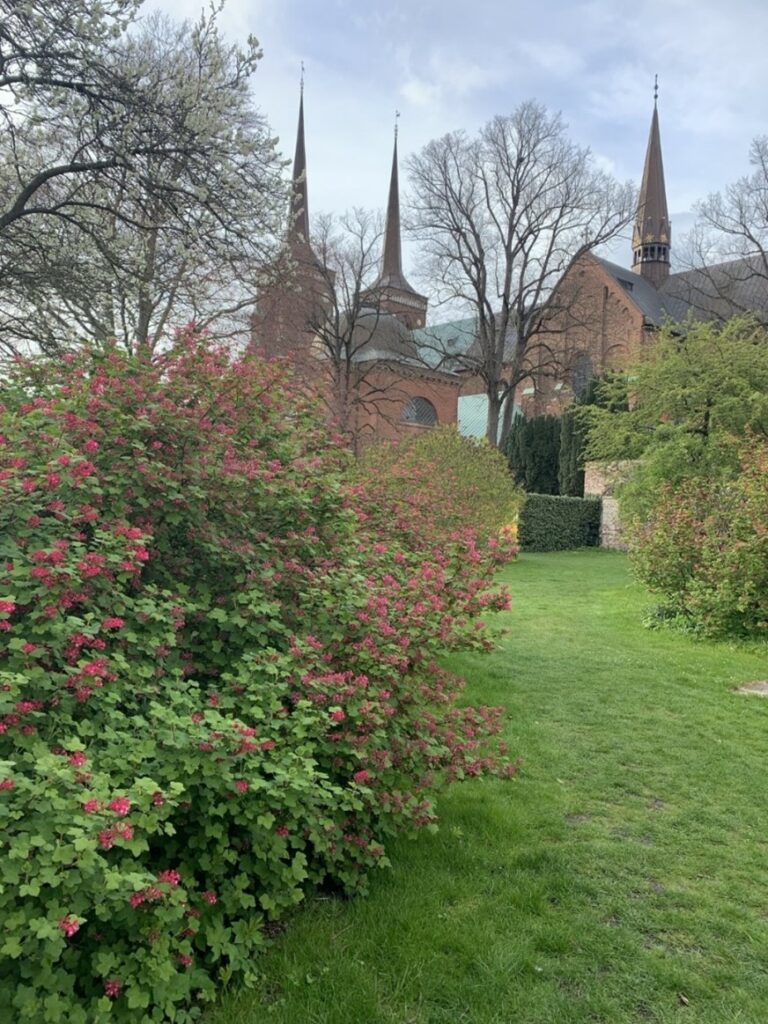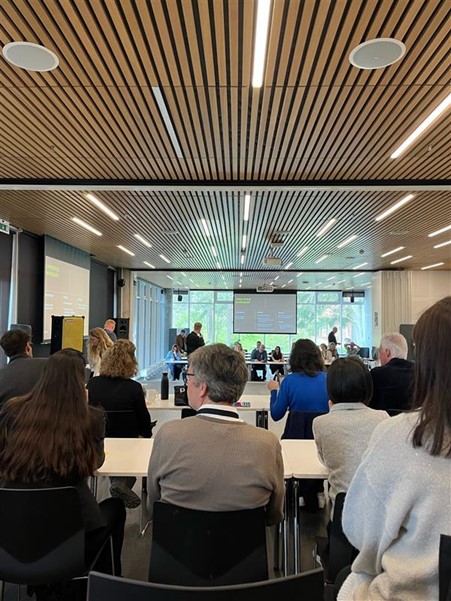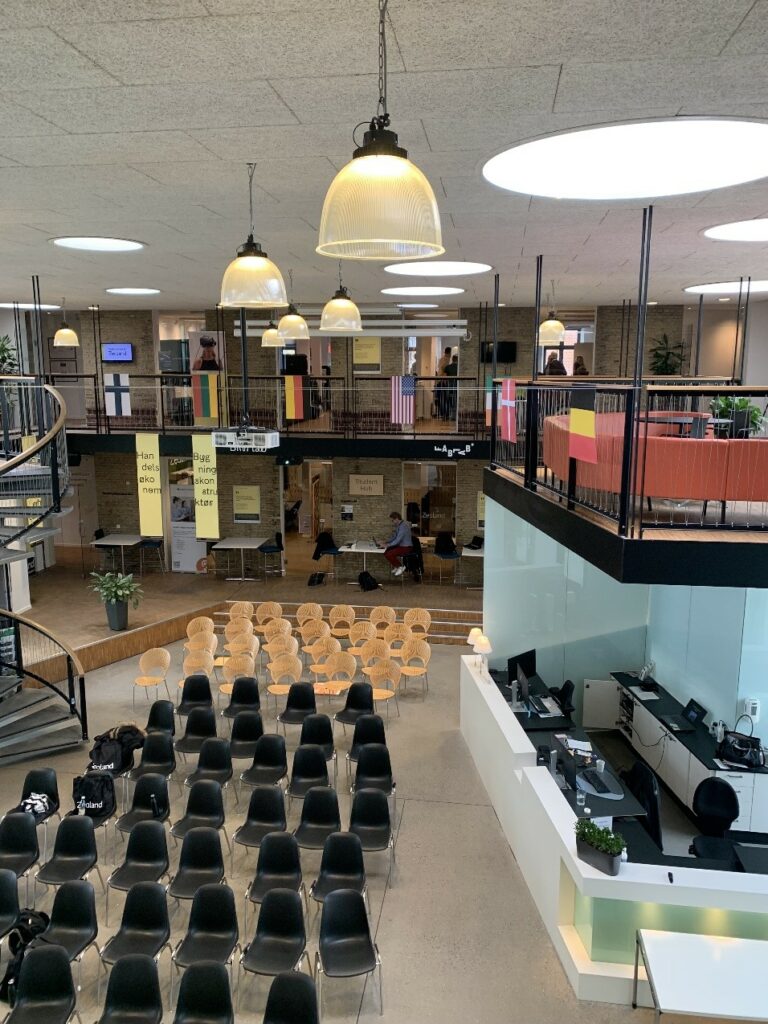In April 2024, I had the opportunity to participate in an international week hosted by Zealand Academy of Technologies and Business in Roskilde through the Erasmus+ Staff Exchange program. The theme of the week was sustainability and sustainable development in higher education. The program included captivating keynote speeches, interactive workshops, and provided participants with valuable insights to take back home. One of the most important takeaways I gained at Zealand was that the power of international cooperation lies in our ability to learn from others and adapt innovative ideas to our own unique contexts in higher education institutions. In this article, I will explore the insights I gained during the week and explore how we could apply these ideas to enhance our sustainable education initiatives at Laurea.
 Roskilde Cathedral’s garden. Photo by Sanni Martikainen
Roskilde Cathedral’s garden. Photo by Sanni Martikainen
Sustainability in Higher Education – How to Embed Sustainability into Existing Curriculum?
According to Corcoran (2010, xiii) sustainability is the metanarrative of our time and it is essential to transition toward a state where sustainability is seamlessly integrated into both our society and educational system. To reform the higher education system, it is necessary to critically examine existing structures and reconsider the operational methods of educational institutions. A successful shift towards sustainable ways of thinking in education calls for higher education professionals to work together across the disciplinary and institutional boundaries – also internationally. (ibid. xiv; Launikari 2024)
The international week at Zealand Academy of Technologies and Business brought together higher education professionals from both academic and administrative staff to explore the theme of how to embed sustainability into existing curriculum (Zealand Academy of Technologies and Business 2024). The first workshop of the week kicked off with a thought-provoking question: “How do we translate insights about sustainability from the classroom into society?” Even though there are no simple answers to such a broad question, the well-composed program helped us gain a better understanding of the wide and complex spectrum of sustainability and encouraged us to think how we can embed sustainability in our work and in the field of education. Each day of the international week had a clear theme: Monday was an introductory day at Campus Roskilde featuring introductory keynotes and workshops. Tuesday’s programme at Campus Køge focused on Artificial Intelligence, and on Wednesday, we explored the theme of sustainable construction at Campus Næstved. Our last two days on Thursday and Friday at Campus Roskilde included the topics of collaboration with local businesses and their wishes regarding sustainability, compiling the thoughts learned during the week, and possible future steps.
The themes of the workshops and keynote speeches around sustainability were diverse and interesting. By listening to the keynote speakers, we learned about, among other things, the role of festivals in sustainable transition by Sanne Stephansen, how prevailing managerial practices can be challenged and how learning from Indigenous enterprises could lead to a more sustainable world of business by Mario Vázquez Maguirre, and sustainability of the Fehmarn Belt Tunnel Project by Jonas Lynge Nielsen and Jacob Baastrup Christensen. During the workshops, we delved into the themes of i.a. artificial Intelligence in research and development, the integration of sustainability into Zealand’s technical study programs, and strategic sustainability for SMEs. In the end of the week, we left Roskilde a little wiser of what could be done in our home institutions and our own work to act towards more sustainable practices.
 The first workshop of the week at Campus Roskilde. Photo by Sanni Martikainen
The first workshop of the week at Campus Roskilde. Photo by Sanni Martikainen
Sustainable Education Initiatives: Learning from Zealand and LSPR
As a member of Laurea’s sustainable education coordination group, I have been reflecting on how the insights I gained during the international week could benefit Laurea’s operations. Two practices shared by colleagues during the international week particularly caught my interest. The first is the sustainable education pilot projects introduced by Linnea Jacobsen, a Specialist Consultant at Zealand Academy of Technologies and Business. At Zealand, they are currently working on both organizational and educational pilot projects with the common goal of creating recommendations for future sustainable actions. The organizational pilot project focuses on optimizing Zealand’s carbon footprint and social impact. The project team is divided into three areas of responsibility: environmental ethics, social ethics, and governance ethics. The team working with the educational pilot project aims to find ways to equip students with relevant competencies for making a sustainable impact in their future workplaces. They’re also developing a playbook based on results from smaller pilots in business, tech, and IT fields. These initiatives at Zealand provide valuable lessons for Laurea, and I’m eager to discuss their potential within our sustainable education coordination group. I look forward to engaging with my fellow group members and other professionals at Laurea, so we can begin developing these ideas further.
The second interesting practice was shared by an Indonesian colleague. At their home institution, the LSPR Institute of Communication & Business in Jakarta, students engage in projects aimed at developing solutions for specific Sustainable Development Goals (SDGs). In practice, the project course taken by LSPR students focuses on a single project, with each new student group building upon the work of the previous group. This collaborative effort creates a long-term project in partnership with the local community. However, project work often prioritizes short-term goals, which can hinder efforts to develop sustainable, long-term solutions (Bresnen et al. 2003, 159). Therefore, maintaining the same project across different student groups is an excellent approach, ensuring continuity and potentially enhancing long-term goal achievement. Laurea’s study model, known as learning by developing (LDB), emphasizes investigative and developmental approaches while students work on projects or tasks (Laurea-ammattikorkeakoulu 2024). Combining the LBD ideology with SDG goals in projects is an approach we can explore further within our sustainable education coordination group – particularly with the lecturers of the group who possess a strong pedagogical background and insights into how such initiatives could thrive at Laurea’s study programmes.
 Participants visiting Campus Næstved. Photo by Sanni Martikainen
Participants visiting Campus Næstved. Photo by Sanni Martikainen
 Campus Næstved. Photo by Sanni Martikainen
Campus Næstved. Photo by Sanni Martikainen
Diverse Perspectives on Sustainability: Educational Institutions as Change Agents
There is a critical need for new, multidisciplinary approaches to address the complex social-environmental challenges of our time. This involves rethinking existing structures and fostering a co-creative mindset that challenges conventional ideas. (Martins 2010, 31-32) Additionally, it’s essential to consider the social, cultural, and geographical context of the community affected by possible proposed changes. On the final day of the international week, we were asked to write down our thoughts of what we learned during the week. I found this note from one of the participants particularly significant:
“Sustainability has different meanings depending on the needs of each country.”
As higher education professionals, we recognize that it’s not always possible to directly apply the same concept from one context to another. However, the strength of international cooperation lies in learning from others and adapting the new ideas to unique contexts. During her keynote on futures thinking at Campus Køge, Liselotte Lyngsø introduced us to the concept of ‘interesting and exciting’. According to her, these words form a powerful pair to keep in mind when contemplating new ideas and alternative approaches for the future. Despite the challenging problems we currently face and will encounter, maintaining a curious attitude, a willingness to learn, and the courage to question existing norms can lead to innovative solutions. In my opinion, these three qualities are the strengths of educational institutions as organizations.
References
- Bresnen, M., Edelman, L., Newell, S., Scarbrough, H. & Swan, J. 2003. “Social practices and the management of knowledge in project environments.” International Journal of Project Management 21(3): 157-166. Social practices and the management of knowledge in project environments – ScienceDirect
- Corcoran, Peter Blaze. 2010. “Foreword: Sustainability Education: Perspectives and Practice across Higher Education.” In Sustainability Education: Perspectives and Practice Across Higher Education, edited by Paula Jones, David Selby and Stephen Sterling, xiix-xiv. New York: Taylor & Francis.
- Laurea-ammattikorkeakoulu 2024. “How we study at Laurea.” Read on 31.5.2024. How we study at Laurea – Laurea-ammattikorkeakoulu
- Launikari, M. 2024. “Sustainable and competitive higher education – Benefits of international cooperation.” Laurea Journal. Sustainable and competitive higher education – Benefits of international cooperation | Laurea Journal
- Martins, R. 2010. “Sustainable Development Requires an Integrated Design Discipline to Address Unique Problems.” Journal for a Global Sustainable Information Society 8(1): 28-35. (PDF) Sustainable Development Requires an Integrated Design Discipline to Address Unique Problems (researchgate.net)
- Zealand Academy of Technologies and Business 2024. “Zealand International Week.” Read on 9.5.2024. ZEALAND INTERNATIONAL WEEK | Zealand